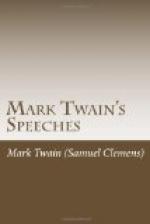Now, Beard got everything that I put into that book and a little more besides. Those pictures of Beard’s in that book—oh, from the first page to the last is one vast sardonic laugh at the trivialities, the servilities of our poor human race, and also at the professions and the insolence of priest-craft and king-craft—those creatures that make slaves of themselves and have not the manliness to shake it off. Beard put it all in that book. I meant it to be there. I put a lot of it there and Beard put the rest.
What publisher of mine in Hartford had an eye for the pennies, and he saved them. He did not waste any on the illustrations. He had a very good artist—Williams—who had never taken a lesson in drawing. Everything he did was original. The publisher hired the cheapest wood-engraver he could find, and in my early books you can see a trace of that. You can see that if Williams had had a chance he would have made some very good pictures. He had a good heart and good intentions.
I had a character in the first book he illustrated—The Innocents Abroad. That was a boy seventeen or eighteen years old—Jack Van Nostrand—a New York boy, who, to my mind, was a very remarkable creature. He and I tried to get Williams to understand that boy, and make a picture of Jack that would be worthy of Jack.
Jack was a most singular combination. He was born and reared in New York here. He was as delicate in his feelings, as clean and pure and refined in his feelings as any lovely girl that ever was, but whenever he expressed a feeling he did it in Bowery slang, and it was a most curious combination—that delicacy of his and that apparent coarseness. There was no coarseness inside of Jack at all, and Jack, in the course of seventeen or eighteen years, had acquired a capital of ignorance that was marvellous—ignorance of various things, not of all things. For instance, he did not know anything about the Bible. He had never been in Sunday-school. Jack got more out of the Holy Land than anybody else, because the others knew what they were expecting, but it was a land of surprises to him.
I said in the book that we found him watching a turtle on a log, stoning that turtle, and he was stoning that turtle because he had read that “The song of the turtle was heard in the land,” and this turtle wouldn’t sing. It sounded absurd, but it was charged on Jack as a fact, and as he went along through that country he had a proper foil in an old rebel colonel, who was superintendent and head engineer in a large Sunday-school in Wheeling, West Virginia. That man was full of enthusiasm wherever he went, and would stand and deliver himself of speeches, and Jack would listen to those speeches of the colonel and wonder.
Jack had made a trip as a child almost across this continent in the first overland stage-coach. That man’s name who ran that line of stages—well, I declare that name is gone. Well, names will go.




